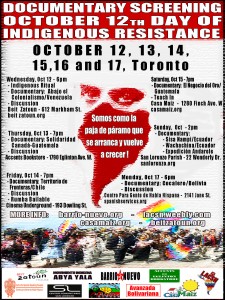New workshop series on indigenous history coming out of Barrio Nuevo
by Santiago Escobar
This past October 12, the First Indian Film Festival was kicked off in Toronto to commemorate the Day of Indigenous Resistance.
 From the perspective of the celebrants of European colonialism, October 12, 1492 is viewed as the day Columbus ‘discovered’ the American continent. From the perspective of the colonized, those civilizations and societies in the ‘Americas’ that were more populous than Western Europe in 1492 (100 million people by some accounts), this day marks the beginning of the most atrocious crime in world history: the beginning of history’s greatest genocide. The mass killing of millions of indigenous peoples, followed by the mass enslavement and trade of Africans, went hand-in-hand with the destruction of an untold number of societies that were stripped of their territories, beliefs and social organization. So it was only appropriate that this past October 12 be the day chosen for the First Indian Film Festival to be kicked off.
From the perspective of the celebrants of European colonialism, October 12, 1492 is viewed as the day Columbus ‘discovered’ the American continent. From the perspective of the colonized, those civilizations and societies in the ‘Americas’ that were more populous than Western Europe in 1492 (100 million people by some accounts), this day marks the beginning of the most atrocious crime in world history: the beginning of history’s greatest genocide. The mass killing of millions of indigenous peoples, followed by the mass enslavement and trade of Africans, went hand-in-hand with the destruction of an untold number of societies that were stripped of their territories, beliefs and social organization. So it was only appropriate that this past October 12 be the day chosen for the First Indian Film Festival to be kicked off.
We mark the 519 years since the beginning of Indigenous Resistance as the victims of European colonization are still paying the price for the dismantling and looting of our already established societies at the hands of those who boasted of having ‘discovered’ the new world. We continue to pay the price for the geographic ignorance of the sailors who accompanied Christopher Columbus on his adventure in search for shorter routes to the Indies (Asia) from Europe.
The colonization and marginalization of our peoples, especially indigenous people, persists into the present. No one can doubt that we are advancing in the fight for true freedom, true independence, and we are now seeing the emergence of progressive governments throughout South America reflecting the accumulation of indigenous peoples’ struggles. But it is still a long way to achieve the desired independence and true freedom.
The Toronto screenings created a space for debate and reflection about the struggles of the indigenous peoples of Central and South America. It must be noted that the films presented were 100% produced and created by indigenous people, transmitting their worldview without intermediaries and without distorting the indigenous and popular struggles. This point is important to stress because normally these kinds of documentaries are produced by foreigners, who are distant to the reality of daily life of indigenous people. Foreigners tend to tell these stories from a liberal perspective and are inclined to represent the Indians as an almost magical subject, perfect, or as a folkloric and romanticized object, ignorant of the deeper meaning of their struggles, which is against colonialism and imperialism – or as it is popularly known, globalization.’ Many of these liberal perspectives overlook or disregard the significance and centrality of the organizational and social formations of indigenous people’s – a basis for the success and achievements of many of these people’s movements.
The attendance during the film festival was vast and generated an awakening of awareness, especially among the Latin American audiences. It created consciousness for public struggles in an historical and cultural context, related to the living spaces claimed by fellow Indians of Central and South America.
The documentaries shown were accompanied by follow-up discussions and analyses from the audience with the aim of understanding and exchanging ideas about indigenous struggles. Recognizing the need to learn more about Central and South American history, the audience unanimously supported the development of a series of workshops dealing with indigenous peoples before the Spanish conquest, during the conquest, throughout the period of the nominally ‘independent’ neo-colonial republics, and the last 30 years of resistance by the indigenous peoples and other social movements from Mexico to Patagonia.
With this wide support from the Latin@ community, we will soon be starting an educational series to address these topics.
To register for this workshop series please write to us at [email protected] .
Comments
